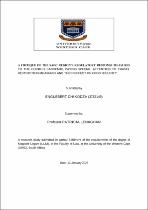| dc.contributor.advisor | Lenaghan, Patricia | |
| dc.contributor.author | Chikodza, Englebert | |
| dc.date.accessioned | 2023-08-10T08:27:56Z | |
| dc.date.available | 2023-08-10T08:27:56Z | |
| dc.date.issued | 2023 | |
| dc.identifier.uri | http://hdl.handle.net/11394/10460 | |
| dc.description | Magister Legum - LLM | en_US |
| dc.description.abstract | The transition in the economy around the globe has led many countries to pursue integration at various levels. The importance of regional integration is highly noted in various parts of the world, with the most successful countries reaping the benefits of such cooperation.
Regional integration bodies such as the European Union (EU) are notable examples of successful integration efforts. Consequently, there has been much backing from the African community for regional assimilation since the attainment of independence from the European colonial powers.1 Regional integration is seen as a rational response to challenges faced by a continent with many small national markets and non-coastal countries | en_US |
| dc.language.iso | en | en_US |
| dc.publisher | University of the Western Cape | en_US |
| dc.subject | Food security | en_US |
| dc.subject | Covid-19 | en_US |
| dc.subject | South Africa | en_US |
| dc.subject | Public health | en_US |
| dc.subject | Labour law | en_US |
| dc.subject | Informal trade | en_US |
| dc.subject | European Union | en_US |
| dc.title | A critique of the SADC region’s regulatory response measures to the Covid-19 pandemic, paying special attention to travel restriction measures and their effect on food security | en_US |
| dc.rights.holder | University of the Western Cape | en_US |

